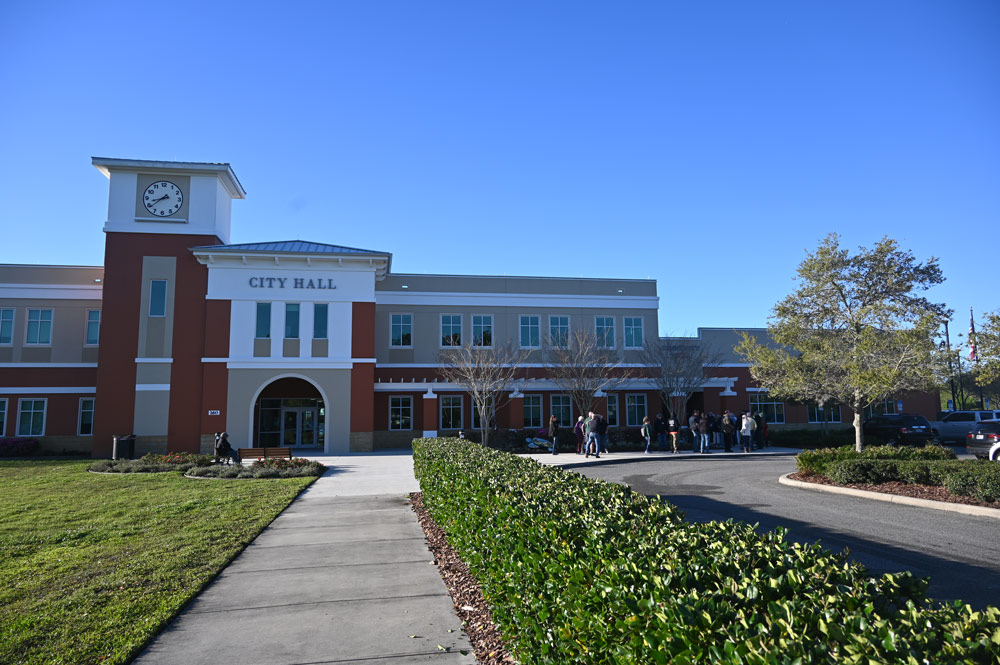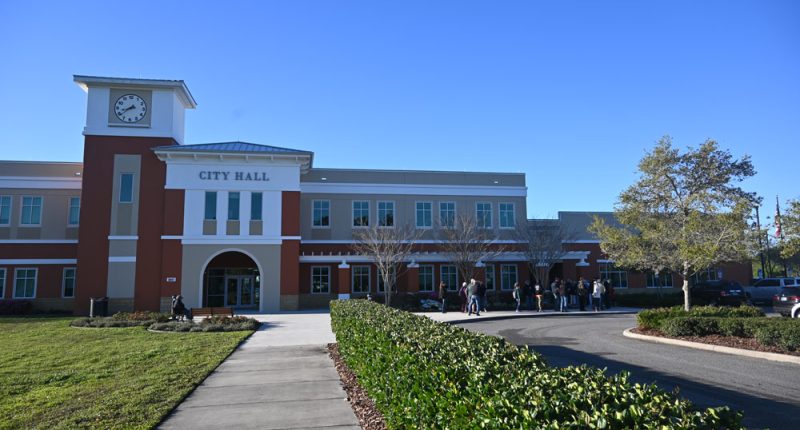
Ten candidates for appointment to the Palm Coast City Council District 3 seat vacated last month by the ailing Ray Stevens individually went before the council Tuesday afternoon in two hours and thirty minutes of interviews ahead of the April 15 appointment.
In contrast with the last such round last summer, when Charles Gambaro was eventually appointed in place of Cathy Heighter, the interviews were well-ordered and free of the kind of overheated partisanship then-Council member Ed Danko threw in the mix.
The candidates were almost all focused on city issues, thoughtfully and without bombast, though some were clearly better prepared than others, usually because of their previous experience in government (as opposed to attempts to get into government: the distinction was also obvious.)
A defining line sharpened as the interviews progressed. It was drawn between candidates who spoke the pragmatism of public-service experience on one side, and candidates who spoke of ideals and private-sector careers they hope to translate into public service. Neither is necessarily its own virtue: by definition, every elected official begins with ideals before accruing experience.
But this council has limited time to make a limited appointment with specific aims ahead, in a term limited to less than two years, and for a position whose learning curve typically takes two years fully to scale. Council members don’t have the luxury of appointing a trainee, however well intentioned, brilliant or potentially accomplished.
The pool of applicants grew to 13 and fell back to 10 after Andrew Werner, Chad Raymond and Scott Pillath withdrew. The council made no decisions. At its April 8 meeting at 6 p.m. it will narrow the list to three finalists. It will vote on an appointment on April 15 at its 9 a.m. meeting.
As in previous such interview rounds, and there’s been many–this is the seventh time since 2016 that a resignation precipitated an appointment or an election–the council invoked its own rule of sequestration: candidates were trooped into a room outside the chamber while the council interviewed each in turn, out of hearing of the others.
In this case Mayor Mike Norris first “corralled” them in a front row to explain the procedure, admonished them–“please don’t use your cell phones, I don’t want you to have an unfair advantage”–then sent them out. He also cautioned against partisanship.
Each was given a three-minute opening statement before council members posed questions–for the most part, the same questions posed to every candidate, with notable variations. Council member Ty Miller asked about the candidates’ goals, or strategic vision. Council member Theresa Pontieri asked how the candidate would have handled the recent utility-rate increase and issues surrounding it, Council member gambaro asked about the type of city manager the candidate is looking for, and about the planned westward expansion, and Norris asked each to offer an example of an ethical dilemma faced and resolved, “where you had to so the hard right over the easy wrong.” There were other questions along the way.
Here’s a brief summary of each interview. The full interviews are viewable here and at the foot of the article. Each candidate’s application is linked.
Mark Burton, 71, a retired architect, was first, and quick to show his familiarity with current council issues, rattling them off one after the other in his opening statement: he was entirely issue-oriented rather than self-aggrandizing or discursive. “I’m definitely for growth, but judicious growth,” he said. Asked what would be on his list of goals–the strategic action plan the council drafts every year–Burton said he’d “increase the tax base,” a sound but too-general wish, without specifics that apply to Palm Coast, other than bringing businesses. How? He didn’t say. He was supportive of the recent increase in utility rates. “Could we have spread it out a bit longer? Possibly.” He did not specify. He spoke of the importance of transparency and consensus, and hiring a city manager experienced in growth, and who thinks on the fly.
Doug Courtney, 70, a P-Section resident, spoke of his 27 years in the county, 25 in the city, and of being one of the city’s first employees, as its clerk. He has a doctorate in information systems technology. For his goals, “what I’d like to do is take care of what we’ve built,” he said, including swales and roads. “Sprawl is bad, but not growing is bad, too. You can’t have no growth, and you can’t have extreme sprawl.” He wants a balance between the two while focusing on keeping what’s in place in good order. He described himself as a listener interested in exploring issues before making decisions. He is not shy about development impact fees, nor about making certain that the infrastructure is in place before the city spreads west. Council member Theresa Pontieri asked him to be more specific. He said investing more in swale maintenance would be one. Second: “I want more details on what’s being built,” though it wasn’t clear how different that would be from how the city’s regulators provide details now. As for a city manager, he wants one who won’t need a learning curve, but rather the opposite: “they need to help us.” To Norris’s ethical-dilemma question, Courtney described how he’d once, 30 years ago, been pressured into not hiring a woman and a Black employee but did so anyway.
Dave Ferguson, 73, of Grand Haven, was appointed to an empty council seat in 2012, and served two years. He proved one of the more searching and interesting exchanges with council members. “I feel a little different being on this side of the dais than sitting out there. It’s a little nerve-wracking,” he said. “I don’t know why. I’ve done this before.” Why do it? He spoke of his own personal, rewarding life and loving the city to “making an impact, and knowing that I can do the job.” He said he’s prepared, motivated and energetic, coming into the potential job as a Score volunteer for the past 10 years. His goals: “I’m all about economic development,” he said. Second: getting the water-treatment issues resolved (though that’s essentially accomplished for now). As for compromise: “I raised four daughters, I have a lot of compromise in my body.”
He’s also a current member of the city’s Planning Board. He spoke of his familiarity with the rights of property owners, and of the board’s responsibilities: “Recently there was a recommendation to approve a storage facility, and my vote was the deciding vote to deny the application,” he said. “Apparently the media thought that was newsworthy. So it’s not always a free ride for the developers.”
Pontieri pressed the point: “Are you willing to push back a little bit when a developer or a landowner comes before Council and want to do something that is maybe not in the best interest of the city, even if they have the right to do it?” (The question’s context is likely the ongoing dispute between the city and a developer over a council decision turning down hundreds of housing units in Seminole Woods.)
“Yeah, that’s a touchy area,” Ferguson replied. “Certainly judgment and discussion and analysis is required to make a prudent choice. You know, I have been involved in several projects that have been approved out in Sawmill Lakes. Those projects were entitled 10 years ago. So it’s kind of hard to say: ‘you can’t build,’ when they were entitled to do it, even though you know that this strains city services, perhaps our fire house close by, etc, water, whatever the ancillary effects of developing. But that’s an example where pushing back wouldn’t probably make a lot of sense.” He is not keen on developers clearing land and leaving it fallow for years, as he sees around town.
His ethical dilemma had to do with a directive from a human resources director to fire an employee. Ferguson was “a rookie” at the time, but had no data himself on which to base his decision. He didn’t fire the employee, moving him to a different city to get him away from his antagonists. “He actually performed well,” Ferguson said, got promoted, moved on to other jobs and remained a contact.
Ferguson spoke well of the five finalists for city manager, with a touching note about the current interim manager: “I don’t know what Lauren will be doing afterward if there’s a new city manager, but I have a soft spot for Lauren in my heart.”
Michael Flanagan, 72, relied on his experience on Grand Haven’s Community Development District board to highlight his experience with local government, the Sunshine law and consensus-building. “You don’t get anywhere by beating people over the head,” he said. His priorities: “water safety,” he said, and working with developers on how to bring that about, along with sewer services. (Developers are responsible for that infrastructure in self-contained subdivisions, but to a much lesser extent on the city’s older lots.) He made a passing reference to traffic. “The other ones, I have to admit, I would need to study more and meet with department heads,” he said. When asked how he keeps fees down on residents at Grand Haven, he said needs as opposed to wants make that decision. “It’s prioritizing,’ he said. “What is it that you actually have to have?” He called social media “an interesting beast, but not always a controlled beast.” He is a member of a lot of such pages, but he said he uses them to point people to websites with evidence while listening to people on the platforms. But he dodged the question on an ethical dilemma by answering it in good-sounding generalities.
Cornelia Downing Manfre, 67, of Grand Haven, had the right–and the drawback–to feel the most comfortable of the candidates at the lectern, from where she has addressed councils more often than any of them. Which is also to say that she’s attempted to join the council more often than any of them, so far unsuccessfully. Her resume and community involvements are long. She spoke of overseeing the development of City Market Place and Roma Court, and “bringing businesses” to the city (without specifying which), and of her negotiating skills. Her goals: hiring a city manager who knows how to manage people and who’s managed a city of Palm Coast’s size, and working on the city’s infrastructure, the central theme of her last campaign (she lost to Norris).
At times she sounded more like a candidate in campaign mode than a candidate for an appointment. Manfre did not hesitate to criticize council finances: “This increase over this past year is something that I was critiquing: where is the money going?” she asked, implying, without evidence, that money was not being accounted for. “And the public deserves to understand where their taxes are going to, and why are we not applying enough of it to the infrastructure. Let’s get that sewage treatment plant one done immediately.” Pontieri challenged her on her claims–which again led Manfre to cite an unidentified example of a commercial building project she said took two years to reach completion, due to city delays. She told Norris: “Honestly, I’ve never had an ethical issue in my career,” adding, improbably, “I’ve not come across having to choose between right and wrong in an issue.”
Joan Paulus, 71, spoke of her concern about the growth she’s witnessed in Palm Coast, from a town of 20,000 to a city of over 100,000. She’d worked in data systems (for the company of Ross Perot, the eccentric third-party presidential candidate of 1992 and 1996), and specializes in “industrial psychology,” or what she described as cutting through misinterpretations about people by becoming more aware of one’s biases.
Paulus approved of the city’s utility plan, including its coming $290 million bond as “somewhat of a good compromise.” She raised questions about a risk assessment about the planned fuel depot off U.S. 1, which has quickly developed into a controversial proposal since it was announced last week. She alluded in too-general terms to reallocating funds to more critical issues, and of favoring a forensic audit. She alone used the word “character” when describing her preferences for the next city manager. She confused an ethical dilemma with good management.
Eugene Perez, 79, an R-Section resident, retired banker and self-employed insurance salesman based in Ormond Beach, proposed using press briefings rather than merely announcing issues on Facebook. But when Miller asked what his high-level priorities would be, he replied: “I wish I could tell you that I have studied the finances of the city well enough to be able to give you a straight, direct answer to that, but I would need to know more before I could really make an intelligent answer.” Pressed, he spoke of tying any decision to the budget and, in an echo of one of former City Manager Jim landon’s mantras, of “protecting the city’s brand” as a top priority. Like Manfre, he said he’s never faced an ethical dilemma. “There’s no hard right. It’s either right or wrong,” he said, “and if it’s right, it’s easy.”
Dana Mark Stancel, 74, of Seminole Woods, quickly reminded the council that had a couple of votes gone the other way, he might have been sitting alongside council members today: he lost the primary to “my friend Ray” Stevens, he said. He has since been appointed to the city’s planning board. He was also quick to refer to his military background, knowing that the council has a soft spot for fatigues. He spoke of the need for an industrial tax base, of expanding west, and generalized about frivolous spending, “find out where we’re wasting money,” a line often used from the floor and just as often–after all these years–lacking specifics. For a new city manager, he underscored the need for someone who’s led a large town.
To answer Norris’s questions on ethics, Stancel cited the example of a soldier on a German army base who committed an unintentional security violation. Stancel was running the post office there at the time. He was punished. He returned to work and did well. “It was a hard decision to report him to the commander, but had to,” Stancel said. (Stanmcel alone was the subject of sharp criticism from a member of the public, who accused Stancel of orchestrating unfair code enforcement cases against him and others.)
Candace Stevens, 56, a P-Section resident who drew public attention as the administrator of Flooded in Palm Coast, the Facebook Page, immediately told the Council: “I kind of feel I’ve been interviewing for this position for the last two years,” she said. She’s been a fixture at council meetings over that time span. “I’ve never been disrespectful or condescending. I’ve always been positive, and I think that we need that here,” she said, describing herself as “collaborative” and fresh-thinking. “It’s not my way or the highway.” She’d considered running for the seat before but felt Ray Stevens was the better candidate. “Right now, I work at a multi-million dollar resort. I write the dessert and the cocktail menu and actually execute those as well,” she said. “So I’ve been made out to be just a bartender. I’m far more than a bartender.” Her priorities are stormwater and the Humane Society’s issues.
Stevens was supportive of the recent utility rate increase, understanding that some people may not afford it as easily as others. She spoke of working with the builders’ association and planning development differently to manage growth, but did not say how. “If there’s cuts that we can make, then we need to make cuts,” she said–again, like previous candidates, not providing examples. As for a city manager, she said she is looking for “somebody who’s made their way up in city government.” A former police officer, she drew on that experience to speak of her ethics. “I was asked to just toss something away and let the person go. That wasn’t my job,” Stevens said. “The elements of the crime were there. You’re guilty, sir, sorry. You’re going to jail.”
Dave Sullivan, 83, never said, Shwarzenegger-style, I’ll be back when he stepped down from the County Commission last November, but there he’s been, appointed to the county’s Contractor Review Board, and now seeking a seat on the council.
The Grand Haven resident is not short on public policy expertise, parliamentary procedure, compromise, a complete mastery of current issues, rare institutional memory (especially for Palm Coast, where the senior council member has just over two years in the seat), and often, clear-eyed candor. Curiously, surprisingly–and to the detriment of his sharp skills on his feet–he alone read his opening statement. It sounded canned.
He only improved from there, speaking of goal-setting ahead as a balancing act, and his experience with tough issues–and missteps: “My approach will be, don’t start a controversy if you don’t know all the facts.”
Pontieri posed him a direct question she had not asked others: his opinion on raising the sales tax by half a cent. He’d been a proponent while on the commission. He’s no less a proponent now. “I think the half-cent sales tax, of the taxes that could be done, is the fairest,” he said, as if it were a settled issue. Most economists disagree: it is a regressive tax, but Sullivan was also right when he pointed out the imbalances of property taxes in the state, given the artificial levy limits on homesteaded homes. “If money has to be raised, and we don’t want to change the millage rate,” meaning the property tax, “I think you’re forced to look at the sales tax.” He noted that Palm Coast would be in line for getting substantial revenue from an increase in the sales tax, even if the county were to take half that revenue for beach management ($2.7 million), and that Palm Coast could spend it on public safety, roads and other needs.
![]()







